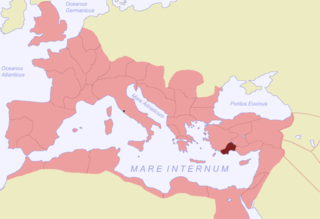Related Research Articles

Gallia Lugdunensis was a province of the Roman Empire in what is now the modern country of France, part of the Celtic territory of Gaul formerly known as Celtica. It is named after its capital Lugdunum, possibly Roman Europe's major city west of Italy, and a major imperial mint. Outside Lugdunum was the Sanctuary of the Three Gauls, where representatives met to celebrate the cult of Rome and Augustus.

Marcus Didius Julianus was Roman emperor for nine weeks from March to June 193, during the Year of the Five Emperors.

The gens Petronia was a plebeian family at ancient Rome. This gens claimed an ancient lineage, as a Petronius Sabinus is mentioned in the time of Lucius Tarquinius Superbus, the last of the Roman kings, but few Petronii are mentioned in the time of the Republic. They are frequently encountered under the Empire, holding numerous consulships, and eventually obtaining the Empire itself during the brief reign of Petronius Maximus in AD 455.

Tiberius Claudius Pompeianus was a politician and military commander during the 2nd century in the Roman Empire. A general under the Emperor Marcus Aurelius, Pompeianus distinguished himself during Rome's wars against the Parthians and the Marcomanni. He was a member of the imperial family due to his marriage to Lucilla, a daughter of Marcus Aurelius, and was a key figure during the emperor's reign. Pompeianus was offered the imperial throne three times, though he refused to claim the title for himself.
Lucius Fabius Cilo, full name Lucius Fabius Cilo Septiminus Catinius Acilianus Lepidus Fulcinianus, was a Roman senator, who was a confidant of Septimius Severus. He held a number of appointments that have been dated to the reigns of Commodus and Severus. He was twice Roman consul: the first time in 193 as a suffect, and the second time as ordinary consul in 204 with Marcus Annius Flavius Libo as his colleague. Cilo is known from numerous inscriptions and appears in the Historia Augusta and the history of Dio Cassius. He married Cilonia Fabia.
Publius Septimius Geta was the second son to the elder Publius Septimius Geta and brother of the emperor Septimius Severus. His mother was Fulvia Pia. He was born and raised in Leptis Magna. He had Italian Roman ancestry on his mother's side, and was descended from Punic forebears on his father's side.

Lycia et Pamphylia was the name of a province of the Roman empire, located in southern Anatolia. It was created by the emperor Vespasian, who merged Lycia and Pamphylia into a single administrative unit. In 43 AD, the emperor Claudius had annexed Lycia. Pamphylia had been a part of the province of Galatia.
The gens Caecinia was a plebeian family of Etruscan origin at ancient Rome. Members of this gens are first mentioned in the time of Cicero, and they remained prominent through the first century of the Empire, before fading into obscurity in the time of the Flavian emperors. A family of this name rose to prominence once more at the beginning of the fifth century.
Marcus Ulpius Eubiotus Leurus was a Roman senator, who was active during the first part of the third century.
The gens Ceionia or Caeionia was an ancient Roman family of imperial times. The first member of the gens to obtain the consulship was Lucius Ceionius Commodus in AD 78. The rise of this family culminated in the elevation of the emperor Lucius Verus, born Lucius Ceionius Commodus, in AD 161.

The gens Ulpia was a Roman family that rose to prominence during the first century AD. The gens is best known from the emperor Marcus Ulpius Trajanus, who reigned from AD 98 to 117. The Thirtieth Legion took its name, Ulpia, in his honor. The city of Serdica, modern day Sofia, was renamed as Ulpia Serdica.
Titus Flavius Claudius Sulpicianus was a Roman statesman who served as Senator and Consul suffectus. He unsuccessfully attempted to succeed his son-in-law Pertinax as Emperor in 193.

Tiberius Claudius Candidus was a Roman general and senator. He played an important role supporting Septimius Severus in the struggle for succession following the assassination of the emperor Pertinax in 193 CE.
Sextus Cornelius Repentinus was a Roman eques who held a number of senior positions during the reigns of Emperors Antoninus Pius and Marcus Aurelius.
Publius Tarrutenius Paternus was a Roman eques who flourished during the reign of emperor Marcus Aurelius. He achieved several military successes, leading first to his appointment as praetorian prefect and subsequently to his adlection into the Roman Senate. Paternus was accused of treason by Aurelius' son and successor Commodus, and executed.
References
- ↑ Anthony Birley, Septimus Severus: the African Emperor, revised edition (New Haven: Yale University, 1989), p. 95
- ↑ Leunissen, Konsuln und Konsulare in der Zeit von Commodus bis Severus Alexander (Amsterdam: J.C. Gieben, 1989), p. 142
- ↑ CIL VIII, 15869
- ↑ Eck, "Eine Laufbahninschrift aus Sicca Veneria und die Stadtpräfektur des Cornelius Repentinus", Voce concordi. Scritti per Claudio Zaccaria, ed. Fulvia Mainardis (Trieste, 2017), pp. 271-278
- ↑ Leunissen, Konsuln und Konsulare, p. 290
- ↑ Historia Augusta, "Didius Julianus", 2.4-3.6
- ↑ Historia Augusta, "Didius Julianus", 8.6